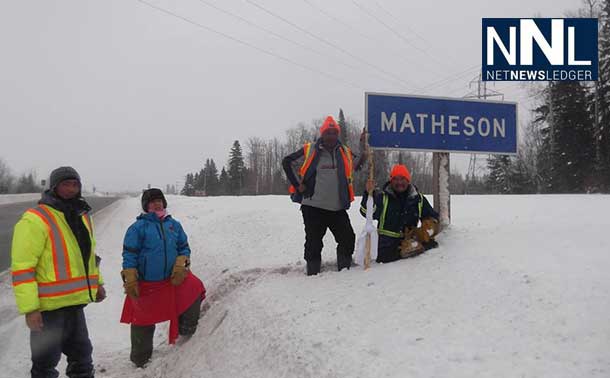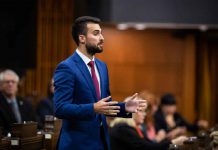
Mushkegowuk Territory – In their 21st day of this spiritual journey, the “Omushkegowuk Walkers” continue their spiritual journey to deliver a strong message from the Aboriginal People (and all Canadians)of Canada to the Prime Minister of Canada and all Provincial Governments and Premiers across Canada; Honourably respect and implement the spirit and intent of the legally binding Treaty agreements now!
“We walked 572 kms in very cold weather through our homelands and it was difficult but very spiritual, meaningful and empowering” says Danny Metatawabin, the leader of the Omushkegowuk Walkers. “We pray as we walk, we encourage each other as we walk, we think about and pray for our children and their children as we walk, we feel the presence of our Creator and ancestors as we walk, we are receiving very powerful messages as we walk, and we need justice, equality and fairness as First Peoples of this country now,” says Metatawabin.
In his statement upon conclusion of his visit to Canada in October 2013, United Nations James Anaya, Special Rapporteur on the rights of indigenous people, said; “From all I have learned, I can only conclude that Canada faces a crisis when it comes to the situation of indigenous peoples of the country.” Anaya said that the Canadian government still has a long way to go in narrowing “the well-being gap” between aboriginals and non-aboriginals.
Canada consistently ranks near the top among countries with respect to human development standards, and yet amidst this wealth and prosperity, aboriginal people live in conditions akin to those in countries that rank much lower and in which poverty abounds.
For instance:
- One in five aboriginal Canadians live in homes in need of serious repair, which are often also overcrowded and contaminated with mould
- Suicide rate among Inuit and First Nations youth on reserve, at more than five times greater than other Canadians
- Aboriginal women are eight times more likely to be murdered than non-indigenous women
- Aboriginal peoples face disproportionately high incarceration rates
Mushkegowuk Council states, “For over a decade, the Auditor General has repeatedly highlighted significant funding disparities between on-reserve services and those available to other Canadians. The Canadian Human Rights Commission has consistently said that the conditions of aboriginal peoples make for the most serious human rights problem in Canada.
“A critical and deciding factor in taking action on the issues described above is when Chief Theresa Spence, from Attawapiskat First Nation showed solidarity by entering into a 41 day hunger strike calling the Government of Canada and Aboriginal organizations to enter into a commitment to reconcile and resolve the problems faced by the Aboriginal Peoples of Canada. Prime Minister Harper and the Assembly of First Nations signed the 13 –Point Declaration of Commitment on January 23, 2013”.
“The Declaration of Commitment calls for immediate action to work together on issues such as treaty implementation, the housing crisis, reforming the comprehensive claims policy; resource revenue sharing; environmental management and consultation, removal of arbitrary funding caps, education, Aboriginal languages, and the implementation of the UN Declaration of the Rights of Indigenous Peoples, including Free and Prior Informed Consent (FPIC)”.
Chief Theresa Spence of the Attawapiskat First Nations stated, “A full year has passed by and we are not aware of any noticeable or satisfactory progress on any of issues in the Declaration of Commitment and we (our leadership) must do their part to make change and progress at their levels as well.”
Grand Chief Dr. Stan Louttit of the Mushkegowuk Council stated, “We are calling on our Chiefs and Leadership alike to take a forceful message to Canada, Ontario, and the general public and to the international stage on the state of our Nations. We have historic and legally binding agreements with the federal and provincial governments. But yet we struggle on a daily basis with lack of basic housing and infrastructure capacity, education and economic development.”
“Why is this so?”
“The government has to get serious about their responsibilities in these Treaties. Ignoring the Treaties, tells us that the government does not take Treaty Relationships and Agreements seriously and they wish that someday, these issues would fade away. But I am telling you right now, that the Treaty movement will continue and we will make the Treaty issue an agenda item in all meetings with the government and we will continue our actions into the future. Does the government wish to continue fighting with us on these various issues or would they rather sit down with us to discuss these important matters in an amicable and respectful way. I would hope the latter”, concluded Grand Chief Dr. Stan Louttit.
The Omushkegwouk Walkers call on all our Allies of the Indigenous Nations to continue supporting the Indigenous people by launching campaigns and rallies across Canada and worldwide.










